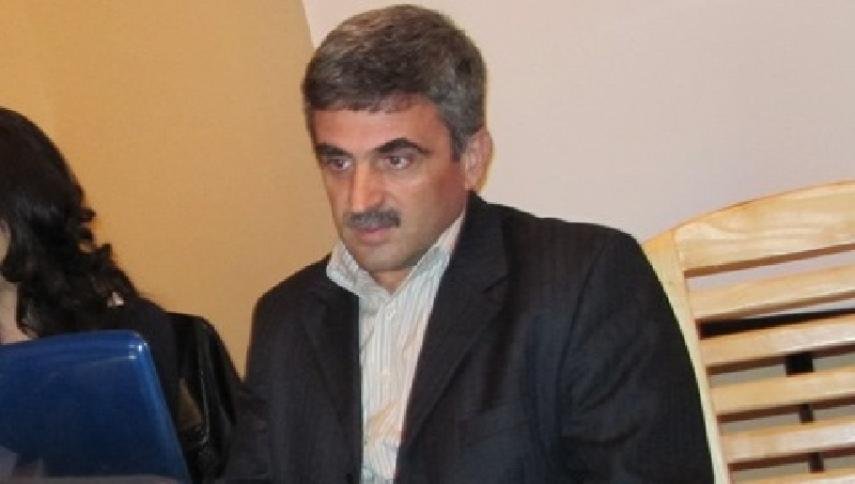NON-GOVERNMENTAL ORGANIZATION
Civil supervision in military forces

From March 22 to 26 the Helsinki Citizens' Assembly Vanadzor office organized a course on "Civil supervision in military forces", which was facilitated by the expert of Bulgarian Institute for Parallel Processing, former soldier Venelin Georgiev. An important part of his lecture was devoted to the civil supervision over the formation of the military budget. Venelin Georgiev kindly agreed to answer our questions.
You are considered a military expert and the subject of your lectures is the civil supervision in Military forces. Which countries have you visited and what is your experience in the military force as a former soldier?
I have worked in Air Force for ten years, trained pilots. Then I have worked in the Ministry of Defense in Bulgaria as a project resources manager and procurement department expert. Last year I have been a trainer in Moldova, then I was invited to Indonesia and now I'm a lecturer in Sofia for the same subject. This year I'm invited to Argentina for a larger project.
Does that mean that you're an international expert?
It's not important how I'm presented; it's important how people perceive me. If I'm invited to different countries as a lecturer, of course I will have a higher qualification and I will become an international expert.
What is important in preparing the budget of the Ministry of Defense? What is peculiar about it?
The security is an important system that can be left in the hands of military elite. But as we have chosen democracy rules as a development path, then it presumes civil and democratic supervision over the Military Forces.
Hence, what peculiarities have you noticed while doing a research in each country and which ones are more remarkable?
I think I am invited to those countries to provide the local structures and specialists with a new experience and knowledge in the security system, but the important part is that those countries and the ones responsible in the sphere should be ready to change the situation in their countries. Of course a great will is needed.
So your efforts are directed towards making the military system more transparent?
That's the main idea of the training - to see how those issues are organized in democratic countries. Though knowing and seeing is not yet enough. There should be a will and efforts should be made. If the Ministry of Defense decides to invest a program budgeting system, I can't say how many people present in today's training will participate.
I'm sure you are aware, that during the electoral processes, especially the presidential elections, the army regularly interferes with the political processes. After the last elections we had 10 victims. How can it be prevented, what successful examples can you bring from the international experience? And why is it said that the army shouldn't interfere with the political processes?
According to the Bulgarian law a military representative can't be engaged in politics.
In Armenia it's also prescribed by law, but...
They have no right to be engaged in politics, but they can take part during the political elections. They can't officially participate in marches, rallies. But last week Bulgarian military was out for a march against the decree of the Executive, based on which the militaries must pay for the insurance.
But that was done for the sake of their rights.
Yes, the militaries were emphasizing that they are ready to pay the same taxes, insurance fees, if given their ordinary civil rights.
In Armenia, however, the army's interference in political processes has exclusively other manifestations.
In Bulgaria the militaries have a pretty good reputation. We can't imagine the militaries to prohibit a peaceful demonstration.
In Armenia the law establishes that the military elite does not have a right to own a business.
The same is in Bulgaria, as the soldier must spend 20 hours in his workplace. As an addition, they can only be engaged in scientific, educational and creative work.
If the law prohibits the military elite to be engaged in business, then what dangers does the state insure itself from? What are the risks?
I'll bring one example from the Bulgarian military force. Our former Defense Minister is charged for abuse of official power. The society doesn't trust him anymore.
Is the Bulgarian judicial system independent?
Yes, according to the Constitution, the judicial, legislative and the executive bodies are independent.
Are there any crime cases in Bulgarian army?
In Bulgaria the crime cases are not too big in number. We don't have murder cases at all. We just have corruption cases.
The presence of "Dedovshina" is becoming a reason for many crimes.
In Bulgaria the military service has become contractual, which brings the violence cases to a minimum.
The Armenian army can be described as a close system. How would you describe the Bulgarian army?
I think that the transparency is currently increasing. This is because the Defense Ministry consults with the representatives of the civil society while making decisions, and they become available to the public.
How long has the Bulgarian army become contractual, and whether this contributed to making the army more open structure?
When the system changed, it brought many changes. During the contractual service the person knows that after serving for some years he can go back to a civil life, that is, it's not necessary to serve in the army for 20 years.
Have you met the representatives of the RA Ministry of Defense?
No.
Interview by Zhanna Alexanyan

